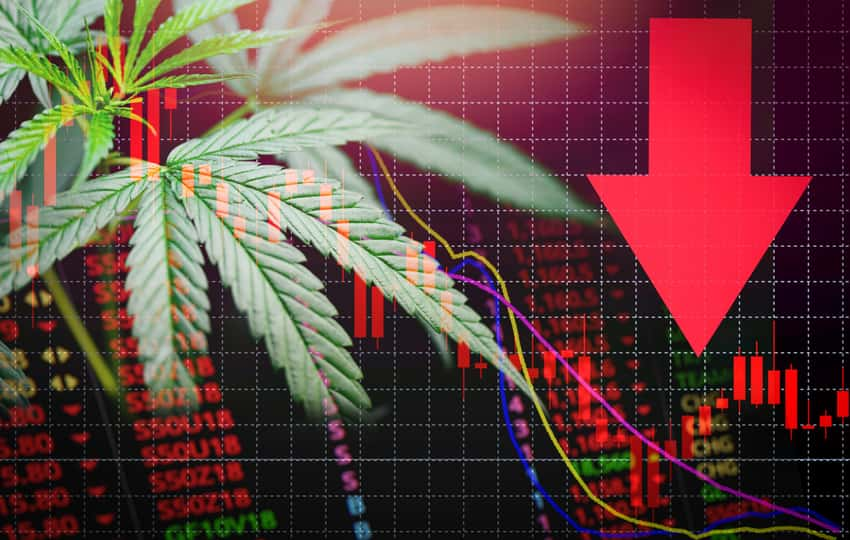The cannabis sector has been in focus ever since the Democrats won the general elections last fall, with their premise to eliminate more cannabis-usage restrictions. Investors are largely bullish on the sector’s growth prospects. The demand for medical and recreational cannabis has increased immensely during the COVID-19 pandemic and regulators are likely to soften their stance toward the use of cannabis soon consistent with the White House’s outlook.
Investors have grown increasingly optimistic about the legalization of adult-use marijuana with the Biden administration taking over the governmental reins. This month, senators Chuck Schumer of New York, and Cory Booker and Ron Wyden of New Jersey and Oregon, respectively, stated that they would move forward with an effort to attain federal legalization of marijuana this year. Cannabis and hemp-based product manufacturers are witnessing a strong momentum on this expectation.
We, too, are optimistic about the long-term prospects of the cannabis sector. However, we also believe that investors must select stocks carefully to ride the sector’s growth. There are many pot companies that are generating losses and face rising debt and weak asset quality. In fact, their financials and growth prospects do not justify the valuations of their stocks.
Tilray, Inc. (TLRY - Get Rating), Aurora Cannabis Inc. (ACB - Get Rating), and Sundial Growers Inc. (SNDL - Get Rating) are three such companies. Their stocks currently look overvalued considering the weakness of their business operations. Thus, we think investors should avoid these stocks at this juncture.
Tilray, Inc. (TLRY - Get Rating)
TLRY is a leading cultivator and seller of medical cannabis globally. In addition to Canada and the United States, the company has operations in the U.K. Argentina, Australia, Germany, Israel, Switzerland and Chile. TLRY also offers its products for to physician for research, as well as to pharmacies, governments, and hospitals in the clinical and commercial sectors.
During the third quarter, ended September 30, 2020, TLRY’s revenue edged up 0.6% to $51.4 million over the year. Its cannabis segment revenue declined 11% year-over-year to $31.4 million because bulk sales has been suspended. It also saw a mild drop in Canadian Medical sales. TLRY’s total cannabis sold fell 53% year-over-year to 5,107 kgs. However, its net loss per share narrowed to $0.02 from $0.37 in the prior year period.
TLRY’s results are too weak for investors to consider the stock positively. . Its revenue growth was weak and medical sales tepid. The company is proceeding in the right direction, but it still has a long way to go to hit profitability. From a financial perspective, we think the stock is overvalued. Its revenue growth and long-term strength must justify its pricing because cost-cutting measures cannot go on forever.
Analysts expect revenue for the quarter ended December 31,2020 to be $55.8 million, representing 18.8% year-over-year growth. Its loss per share is likely to narrow 93% to $0.15.
TLRY has climbed 46.2% during the past year to close Friday’s session at $25.72. Over the past six months, the stock rallied 217.14%.
TLRY’s POWR Ratings are consistent with this bleak outlook. TLRY has an overall rating of F, which equates to a Strong Sell in our proprietary rating system. The POWR Ratings are calculated by considering 118 different factors with each factor weighted to an optimal degree.
TLRY has a grade of C for Growth and Momentum, and F for Value, Stability, and Quality. Of 478 stocks in the Medical – Pharmaceuticals industry, it is ranked #2.
In addition to the POWR Ratings grades I have just highlighted, you can see TLRY’s ratings for Sentiment here.
Aurora Cannabis Inc. (ACB - Get Rating)
ACB produces and sells medical cannabis, which includes various strains of dried cannabis, cannabis oil and capsules, as well as topical kits. Daily Special, ROAR Sports, CanniMed, AltaVie, MedReleaf, Whistler, Woodstock constitute its brand portfolio. In addition, the company sells accessories such as vaporizers, consumable vaporizer, valves, screens, and herb mills for consuming its CanniMed products.
During the first quarter, ended September 30, 2020, ACB’s revenue declined 8.2% to $52.7 million. The company is executing rigorous cost cutting. In its operational note on December 16, ACB indicated its shift to a variable cost structure and the rolling back of production of some of its products. ACB is seeking to align its production to be aligned with demand for its premium flower.
Hence, it is evident that the company is still in a turnaround mode and its valuation does not reflect its true worth. ACB is trying hard to be financially viable. On January 22, the company raised $125 million from its sale of 12 million shares of stock. This shows that the company is trying to rebuild its business but has not yet hit any important milestones.
Analysts expect ACB’s revenue for the quarter ended December 31, 020 to be $54.7 million, representing a 28.8% decline year-over-year. Its loss per share is likely to contract 91.2% to $0.19.
ACB ended yesterday’s trading session at $12.81, declining 49.7% over the past year. During the past six months, ACB gained 19.5%.
ACB’s gloomy prospects are reflected in its POWR Ratings. The stock has an overall rating of F, which equates to Strong Sell in our proprietary rating system. It has a B for Growth, a C for Momentum, and a D for Value grade. It is ranked #223 in the Medical – Pharmaceuticals industry.
In total, we rate ACB on eight different levels. Beyond what we have stated above, we have also given ACB grades for Quality, Stability, and Sentiment. Get all the ACB ratings here.
Sundial Growers Inc. (SNDL - Get Rating)
SNDL is involved in the production, sales, and distribution of recreational marijuana. The company also distributes and sells ornamental herbs and plants in the United Kingdom. Top Leaf, Sundial Cannabis, Grasslands, and Palmetto are some of the brands under which SNDL sells its products.
During the third quarter ended September 30, 2020, SNDL’s net cannabis revenue declined 36% year-over-year to $12.9 million, while its branded cannabis sales surged 77% over the year. Dried bulk cost per gram sold was $1.18, signifying a 12% decline over the previous year. SNDL’s net loss expanded 13% over the quarter to $71.4 million.
SNDL’s financial condition is unstable, and management’s efforts to improve the situation are insufficient. The company is grappling with mounting losses and a high level of impaired assets. The absence of strong fundamentals raises questions about its stocks’ valuation.
A consensus revenue estimate for the quarter ended December 31, 2020 was $11.8 billion, Representing a 25.6% decrease year-over-year. Meanwhile, its loss per share is likely to narrow 94.1% to $0.06.
Over the past year, SNDL retreated 13.7% to end yesterday’s trading session at $1.13. Over the past six months, the stock surged 96.6%.
SNDL’s dismal prospects are also apparent in its POWR Ratings. The stock has an overall rating of F, which equates to Strong Sell in our proprietary rating system. SNDL has a Value Grade of D, and Momentum and Quality Grades of C and F, respectively. In the Medical – Pharmaceuticals industry, it is ranked #225.
Click here to see the additional POWR Ratings for SNDL (Growth, Stability and Sentiment).
Want More Great Investing Ideas?
9 “MUST OWN” Growth Stocks for 2021
February Stock Outlook & Trading Plan
7 Best ETFs for the NEXT Bull Market
5 WINNING Stocks Chart Patterns
TLRY shares were trading at $29.42 per share on Monday afternoon, up $3.70 (+14.39%). Year-to-date, TLRY has gained 256.17%, versus a 4.05% rise in the benchmark S&P 500 index during the same period.
About the Author: Namrata Sen Chanda

Namrata is an accomplished financial journalist, with nearly a decade of experience. She specializes in interpreting news releases and framing investment strategies, and has worked with some of the leading companies in real estate, banking, insurance, mutual funds, financial research, fintech, and investment education. More...
More Resources for the Stocks in this Article
| Ticker | POWR Rating | Industry Rank | Rank in Industry |
| TLRY | Get Rating | Get Rating | Get Rating |
| ACB | Get Rating | Get Rating | Get Rating |
| SNDL | Get Rating | Get Rating | Get Rating |






